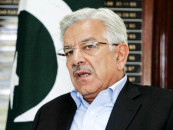Changing our destiny
We must honour our own commitments as a worthy partner in this unique historic joint venture

The writer is a former foreign secretary
President Xi Jinping depicted the true picture of the exemplary China-Pakistan relationship by adding: “Over the years, thanks to the nurturing of generations of leaders and people from all sectors of both countries, the China-Pakistan friendship has flourished like a tree growing tall and strong. No matter what the circumstances in our two countries, the region and the world, our bilateral relations have enjoyed sound and steady growth. We have always respected, understood and supported each other on issues concerning our respective core interests.”
This indeed is a factual reflection of the China-Pakistan friendship which spans almost the entire period of their independent statehood. Pakistan was among the first countries to recognise the new government in China soon after its proclamation on October 1, 1949 as the People’s Republic of China. In 1950, it opened its diplomatic mission in Beijing. Since then, a close and cooperative relationship with China constitutes the centre point of Pakistan’s foreign policy. It is a long-term partnership for peace, stability and prosperity at the bilateral, regional and international levels.
A unique feature of this relationship is the complete trust and confidence between the two countries which evokes spontaneous goodwill and support between their peoples. No wonder, their friendship is not based on transient interests or expediencies, and is above personalities or any changes in domestic or international situations. In their external relations, China and Pakistan are guided by the eternal principles of peaceful co-existence and mutually beneficial cooperation. They have supported each other in their just causes, which include, for Pakistan, a peaceful settlement of the Kashmir issue and preservation of its independence and territorial integrity and for China, the issues of Taiwan, human rights, Tibet and Xinjiang.
A tradition of regular high-level exchanges and governmental contacts helps them keep their relationship strong and enduring with ever-growing cooperation in all areas of mutual interest, including the fields of economy, trade, investment, science and technology, energy, communication infrastructure, education, defence and security. At their bilateral level, mutual support and cooperation, common perceptions and convergence of strategic interests provide a special depth to their relationship. A strong, strategic dimension of their partnership not only serves their mutual interest but also ensures the stability and security of our region.
During his landmark visit, the first by a Chinese head of state in nine years, President Xi Jinping signed more than 50 agreements involving trade and investment deals worth $28 billion as part of the proposed $46 billion China-Pakistan Economic Corridor (CPEC) project, which envisions Chinese investment fuelling road, rail, electricity and other projects that would create a trade route from the western Chinese city of Kashghar to the southern Pakistani port of Gwadar. The top priority will be given to energy-related projects which will be completed by 2018. There are still gaps on the financing of these projects but the Chinese are upbeat in their commitment to their timely completion.
Economic cooperation is indeed the bedrock of this multidimensional relationship. From the Karakoram Highway reviving and revitalising the old Silk Route to the newly-completed Gwadar Port, a whole string of industrial plants, factories, electrical and mechanical complexes and power-producing units including hydro and nuclear power plants, stand testimony to this reality. During his two visits to China after assuming office in 2013, Prime Minister Nawaz Sharif was able to firm up commitments with the Chinese leadership on these mega-projects linked to the economic corridor and also lined up the follow-up with major Chinese construction companies as well as investment and financial institutions.
The real challenge for both now remains how vigorously and faithfully they can translate this common vision into reality. On their part, the Chinese have always delivered on their commitment. Their help has always been selflessly unconditioned involving sacrifices even in terms of Chinese lives. Even today, thousands of Chinese engineers and workers are engaged under most difficult conditions in building roads, bridges, tunnels, dams, schools and hospitals for the people of Pakistan. The problem is on our side. The basic ingredients of economic activity — consistent policies, a stable law and order situation and supporting infrastructure including requisite energy — are missing in our country.
The history of two vital aspects of our cooperation with China — trade potential and the Gwadar Port — totally neglected by us for almost a decade should be an eye-opener for our capacity or ability to ensure time-barred and cost-effective completion of the new projects. The problem is we do not even have a policy or priority framework nor do we have an integrated approach in handling development projects and funds, which often lapse due to non-utilisation. A number of projects are lost or abandoned only because there is no coordination among the relevant agencies of our government. We must redress the situation sooner rather than later.
Encompassing a whole range of connectivity, construction, trade and economic and technical cooperation, the CPEC will bring economic and trade connectivity, bilaterally as well as regionally, which would also be of great benefit to landlocked Afghanistan. It is a game-changer for both countries involving a huge agenda and a common vision for a better future for their own peoples as well as for the peace and prosperity of their region. For China, it is the ‘national rejuvenation’ through accelerated development of its backward north-western regions whereas for Pakistan, it is the fulfillment of its dream for long-overdue economic transformation.
We must honour our own commitments as a worthy partner in this unique historic joint venture. There will be many obstacles domestically as well as externally to subvert the very concept of the economic corridor. We must forestall them. Our first and foremost responsibility is to provide the needed political support and requisite security framework for its smooth unhindered implementation. To do so, we must have an autonomous high-level strategic authority free of bureaucratic and procedural bottlenecks with its own budgetary, administrative and security mechanisms. Let this be another KRL. We must not repeat the history of the Kalabagh Dam. Let’s change our own destiny.
Published in The Express Tribune, May 9th, 2015.
Like Opinion & Editorial on Facebook, follow @ETOpEd on Twitter to receive all updates on all our daily pieces.



















COMMENTS
Comments are moderated and generally will be posted if they are on-topic and not abusive.
For more information, please see our Comments FAQ